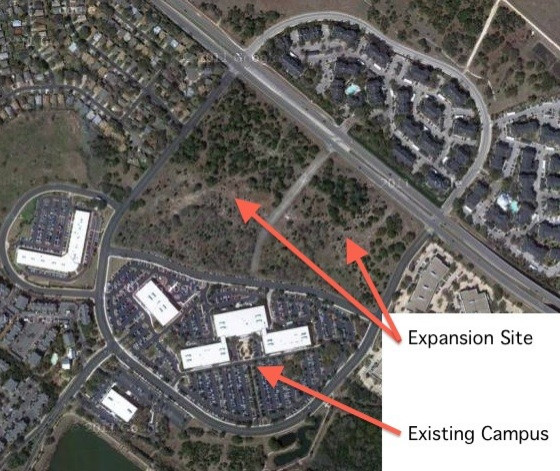Apple Gets Final Approval For Tax Incentives, Can Now Begin Expanding Austin Campus

After several delays, the Travis County Commissioners Court has officially given its final stamp of approval on the tax incentives package offered from the state and local governments, which means Apple can finally start preparing to build facilities and add jobs to its sprawling campus in Austin, Texas. Travis County was the last holdout to approve the incentives package, after the State of Texas and the City of Austin already approved the deal.
In late-April, Dave Porter, the senior VP for economic development at the Greater Austin Chamber of Commerce, said Apple was getting annoyed that the Commissioners Court was taking so long to deliberate on the conditions of the incentives deal.
This deal is not done, Porter said. It remains in peril. And Apple is frustrated.
The initial incentives package was created as a way to secure Apple's commitment to staying and creating jobs in Austin. The $36 million offer -- spread over 10 to 15 years -- was comprised of $21 million from the Texas Enterprise Fund, $8.6 million from the city of Austin, and between $5.4 million and $6.4 million from Travis County.
Travis County had granted initial approval of the package on April 17, but a few members of the Commissioners Court -- specifically, former Travis County judge Bill Aleshire and Austin-area developer Ed Wendler -- continued to pick through the final draft of its contract with Apple, pointing out parts of the offer they believed would let Apple fall short of its requirements by the Commissioners Court.
I'm not sorry that Apple is frustrated, Aleshire said. That's a sorry contract. [Apple] had it rigged so they could not comply with the contract yet end up with county staff basically renegotiating the terms that they would have to comply with. I just throught that was a major flaw. It showed up in several ways in several places.
Apparently, the Commissioners Court made a few tweaks to the contract, also adding language that would require Apple to pay the lowest-salaried 10 percent of the new employees at its Austin campus an average of $35,000 per year, and also requires the company to pay a minimum of $11 per hour to contractors, which could make up about 25 percent of all new hires. Jason Lundgaard, Apple's representative for governmental affairs, attended the session and answered any questions posed by the county commissioners.
When last week's deliberations resulted in another delay, Porter said that he was disappointed the deal could not be finalized, but he said he was hopeful that Apple and Travis County could complete the negotiation process in the first week of May. And that's exactly what happened.
Apple has had operations in Texas for about 20 years, but an expansion in Austin would double the size of its support team there and create more than 3,600 new jobs in the city -- many of them for entry-level help desk employees. Mayor Lee Leffingwell, echoing other Austin city officials' sentiments, recognizes Apple's wishes as a great opportunity to create good jobs that pay, especially for all of the college students, mainly from nearby University of Texas.
Apple would also invest more than $304 million into Austin over the next decade. It's all part of Apple's plans to build a major center for its North and South American business operations.
Apple is known for its bold innovation and game-changing designs, and the expansion of their Austin facility adds to the growing list of visionary high-tech companies that have found that Texas' economic climate is a perfect fit for their future, thanks to our low taxes, reasonable and predictable regulations, fair legal system and skilled workforce said Gov. Rick Perry. Investments like this further Texas' potential to become the nation's next high-tech hub.
Austin is already home to some of Apple's competitors, including ARM, Intel and Samsung, which currently owns a sprawling 1.6 million square-foot factory in Austin -- the size of nine football fields -- that took a whopping $3.6 billion to build. Austin's Chamber of Commerce says Samsung's total investment is actually much higher than that, falling short of just about $9 billion. Samsung's factory, which actually builds several components for Apple like its A4 and A5 processors, is the largest foreign investment in the state of Texas.
© Copyright IBTimes 2025. All rights reserved.






















